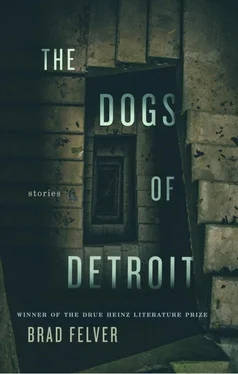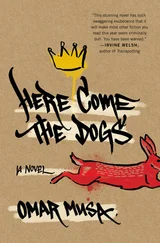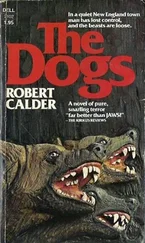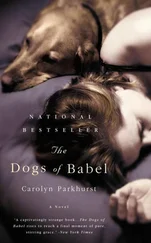“You’ve convinced him he can really fight.”
“Progressions are slow,” Thiago says. “This confidence is important.”
“And if it’s misguided?” I ask. “He’s six-four and 156 pounds. Jiu-jitsu doesn’t change that, but he thinks it does.”
It reminds of being a little boy myself, and my parents fighting over my first pellet gun. I was nine, and new people moved next door. They hitched bird feeders to everything: trees, benches, mailboxes, street lamps. If it wasn’t a human or currently on fire, they fastened a bird feeder to it. Apparently the man was an ornithologist. It was still cold then, so there weren’t flocks of birds, but my father didn’t want to risk it. He bought me a pellet gun without talking to my mother.
“Just in case,” he said to her. He didn’t want to spend his evenings scraping pigeon shit off his grill.
“You’re a blockhead,” my mother said. “You give him a gun because we might develop a pigeon problem? Once the kid has the gun, I promise he’ll discover a pigeon problem.”
Thiago shakes his head to this. “No, no,” he says. “Post hoc, ergo propter hoc. After, therefore because. Your mother believes you will kill the pigeons because you have a gun, but this is not true.”
I stare at him.
“You will kill the pigeons,” Thiago says, “because you are a nine-year-old boy.”
And I suppose he’s right. I did kill pigeons, dozens of them, and long after the bird feeder people moved away.
The doctor approaches us both and tells us it was a bad dislocation, and there is also some ligament damage. He needs to keep weight off of it for several weeks. “How exactly did it happen?” he asks.
“He fell off the roof,” I say. “We were patching some shingles.”
“In November?” he says and looks at Thiago. “Nothing dangerous for a while, gentlemen.”
Jared limps on crutches, never complaining. He’s a different kid than he used to be. He sits on the couch and shadowboxes while watching old fights. He shouts into the kitchen that his dinners need more protein in them. He does upper body and core workouts. He grows a patchy beard. He heals slowly.
By Thanksgiving, he’s upright again. Thiago shows up that evening to roll on the mat with Jared, but we give him the night off. He stays for dinner, sitting across from me in my ex-wife’s former chair.
He finds Thanksgiving to be an odd holiday. “This one is for celebrate your good relations with Indians?” he asks, and I tell him that’s correct.
He shakes his head. “Americans,” he says and then eats a heaping pile of stuffing and green beans. Over crummy, store-bought pumpkin pie, he suggests a full-contact sparring session now that Jared is healed. “Is the next step,” he says. He believes Jared is ready to face another student.
“Full-contact?” Jared says.
Thiago nods. “In the cage, full rounds, no headgear.” He clearly has not considered that someone could be nervous for a fight. For Thiago, a fight is one item on an agenda: buy facial tissues, get oil change, punch people in the brain.
Jared looks over at me and nods. “This is good,” he says.
It’s odd, the sensation this gives me. A strange combination of embarrassment and mortification and pride.
Jared turns eighteen, and I buy three tickets to a cage-fighting event in Detroit. “Midwest Cage Fighting Touring Promotions?” he asks, reading the ticket. “Way to go all out, Dad.” I realize this promotion isn’t the most prestigious, kind of like watching a minor league baseball game with the Battle Creek Opossums. It’s an amateur promotion. An open-mic night for fledgling ninjas.
We take Thiago along, all riding together like some new-age family en route to the local buffet. I ask Thiago about his own family, realizing I never have, and he tells us that he has not seen them for seven years. He looks out the window at the passing city lights. “My wife,” he says, “she dislikes my fighting. Says I spend so much times on my back, I should be prostitute.” He pauses. “My sons soldier for drug cartels,” he says.
I turn and look at him. He shrugs. “Is all fighting,” he says. “No cages for my boys, though.”
I don’t know what to say to this. We ride in silence the rest of the way, but I keep picturing Thiago’s boys, camouflaged in the wilderness, searching for rival drug mules, shouldering their AK-47s, shouting commands and then pointing their guns at anything that moves too quickly.
We sit cage-side in what seems to be a junior high gymnasium. I enjoy the fighter introductions, especially the nicknames, so menacing they’re comical: Brent “The Kalamazoo Wolverine” Carlson; “Vodka” Joe Nemerov; Jonah “Rigor Mortis” Morris. I tell Jared his new nickname is “Giraffe,” but he finds this less funny than I do. In fact, he looks tense sitting this close. He leans back on his seat, as if it is an electric fence he must never touch.
The main event is a lightweight match—Jared’s division—between a local kid with no nickname who wears glasses to the ring and looks like he came directly from biology class and “Vodka” Joe Nemerov. Vodka Joe couldn’t possibly look more Russian if he bench-pressed Lenin’s embalmed body in the middle of Red Square. His widow’s peak descends between his eyes like an arrowhead, and he grimaces for no apparent reason. I suspect his solution to a broken clavicle would involve rubbing bear fat on it. His eyes bulge and do not leave Dr. Biology.
Dr. Biology is outclassed. The program tells us he holds a black belt in jiu-jitsu, but it seems hard for him to enact any defense or submission while he’s getting punched in the head. Vodka Joe thumps his face so many times, it swells tight and goes tomato red. His cheeks puff inward, as if trying to pinch his nose. An elbow slices above his eye, leaving a canyon of a gash. By the end of the first round, Dr. Biology is a limping, bleeding pile of loss.
In the second round, Vodka Joe pins him up against the fence directly in front of us. He punches down, drops elbows onto Dr. Biology’s head again and again, like enormous pistons reciprocating in their cylinders. Dr. Biology can’t move—the cage curls him up in an awkward position—and we hear him moan, long, guttural whimpers like some pathetic animal in the process of becoming roadkill. I stand up, lean toward the cage for better angle, and when I do, Vodka Joe drops a stiff right cross onto the kid’s mouth, loosing gobs of thick blood and spittle through the cage and onto my jacket. I breathe it in, the blood and sweat, and I briefly think that I could do this, that its base is pure violence, not martial arts. I could pound other men in the head, slice down with elbows. These men should feel lucky that they have a cage guarding them from me.
The referee finally steps in and waves his arms, and Vodka Joe starts celebrating. Dr. Biology sits against the cage like a tree stump. I turn back to see Jared wiping splattered blood from his brow. He isn’t looking at me, isn’t looking at the cage. He gazes down, taking long breaths. Sitting cage-side is new to him. Blood is new to him. Thiago sits next to him, legs crossed and calm, as if he has just listened to a panel of blue hairs talk about doilies and denture cream.
No one talks during the drive home. Jared says good night very quietly and closes his bedroom door. I examine myself in the mirror and realize I’ve somehow missed a dried speck of Dr. Biology’s blood that must have splashed me. I lean in close and scratch it off.
I lie on the couch and picture the fight. I can’t ignore how badly I wanted to jump in there and help, tear through the cage and kick the poor kid like Vodka Joe, like my next meal depended on it. The damage I could have done. I’m suddenly a hunter, a ferocious brute of a man, a shirtless Roman stomping into the Flavian Amphitheater to dispatch all living things. Thiago is right: humans are fighters. We’re a violent and successful species. We didn’t rise to the top of the food chain by baking muffins for our predators. We did it by making them our prey. And now that all our natural predators gone, now that we’ve conquered them and erected mini-malls in their old habitats, we turn toward one another because what every species covets is an enemy.
Читать дальше












